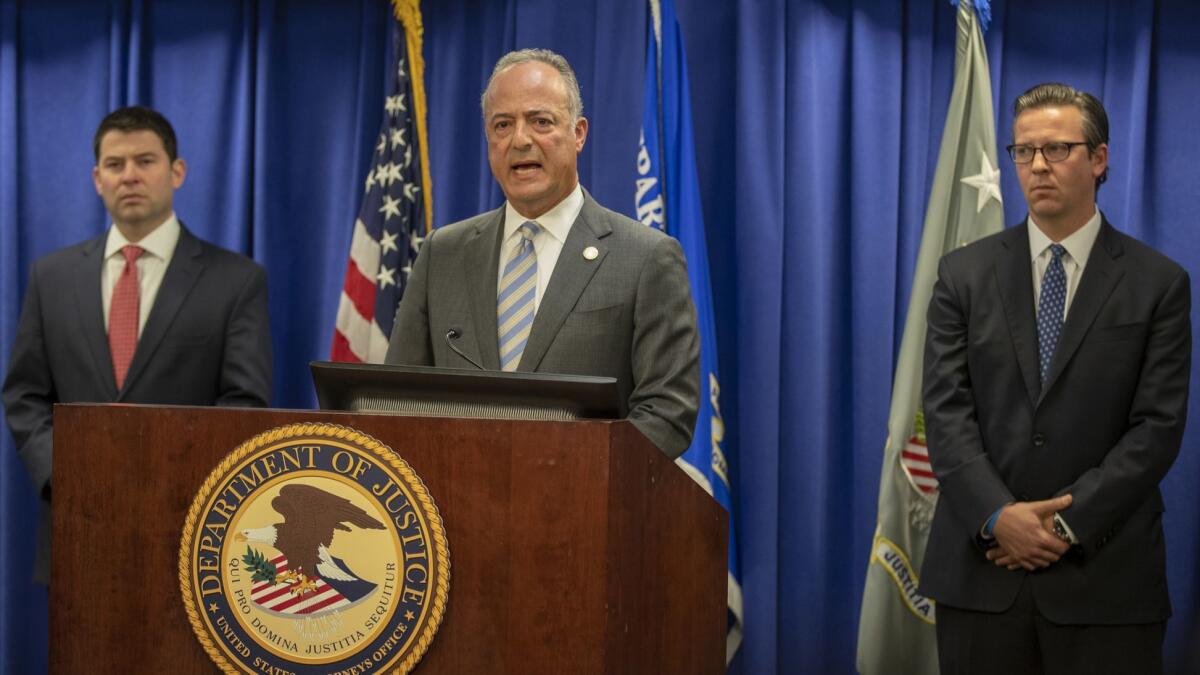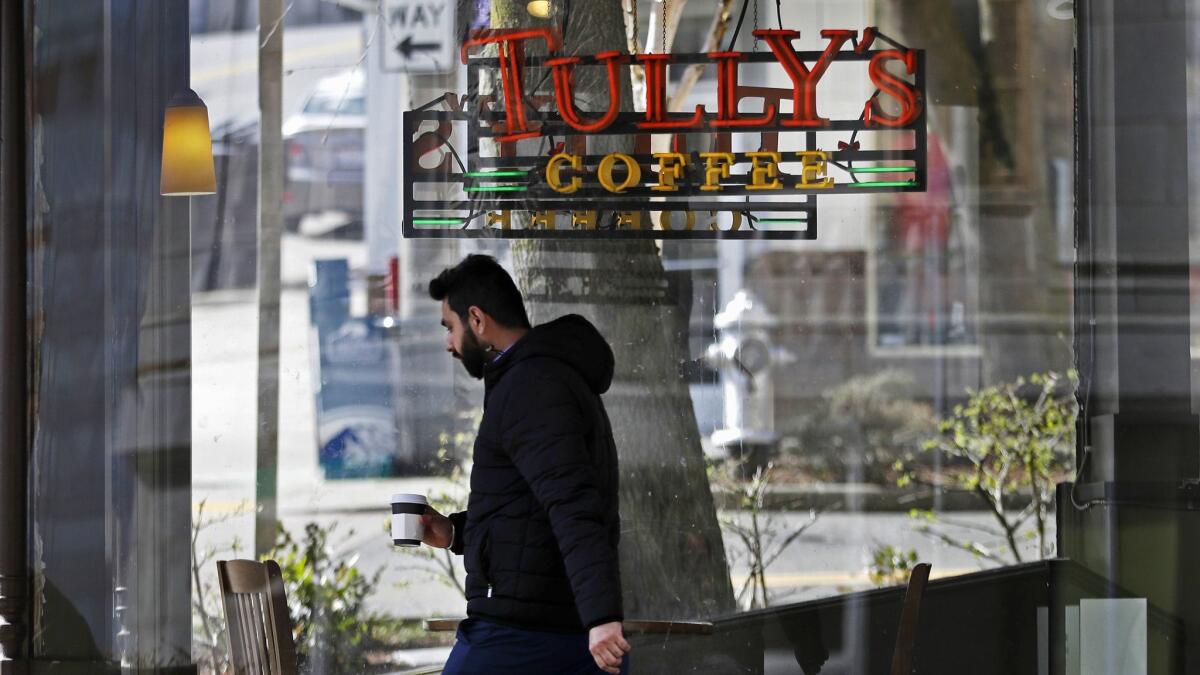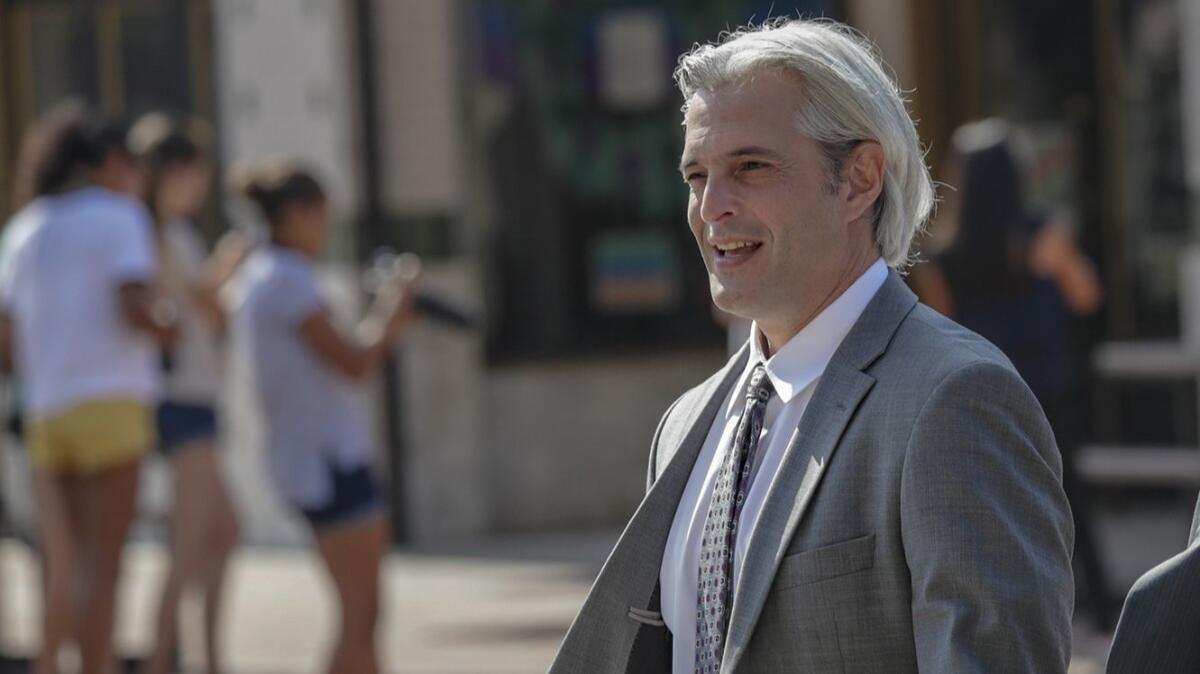Must Reads: Avenatti indicted on 36 charges of tax dodging, perjury, theft from clients

A federal grand jury has indicted Los Angeles lawyer Michael Avenatti on 36 counts of fraud, perjury, tax dodging, embezzlement and other financial crimes.
- Share via
In a sweeping expansion of the criminal charges against Michael Avenatti, a federal grand jury has indicted the Los Angeles lawyer on 36 counts of fraud, perjury, failure to pay taxes, embezzlement and other financial crimes.
Avenatti stole millions of dollars from five clients and used a tangled web of shell companies and bank accounts to cover up the theft, the Santa Ana grand jury alleged in an indictment that prosecutors made public Thursday.
One of the clients, Geoffrey Ernest Johnson, was a mentally ill paraplegic on disability who won a $4-million settlement of a suit against Los Angeles County. The money was wired to Avenatti in January 2015, but he hid it from Johnson for years, according to the indictment.
In 2017, Avenatti received $2.75 million in proceeds from another client’s legal settlement, but concealed that too, the indictment says. The next day, he put $2.5 million of that money into the purchase of a private jet for Passport 420, LLC, a company he effectively owned, according to prosecutors.
At the time, Avenatti and his businesses owed millions of dollars in back taxes, the government claimed, and his Newport Beach law firm, Eagan Avenatti, was weeks from bankruptcy.
Federal agents seized the Honda HA-420 jet at Santa Barbara Airport on Wednesday under a court-approved warrant that remains under seal, said Thom Mrozek, a spokesman for the U.S. attorney’s office in Los Angeles.
“Michael Avenatti allegedly stole from his clients, and he stole from the IRS,” said Ryan L. Korner, the chief of Internal Revenue Service criminal investigations in Los Angeles. “The money was used to fuel a lavish lifestyle that had no limits, including making mortgage payments on a multimillion-dollar home in Laguna Beach and purchasing a private plane.”
The breadth of Avenatti’s alleged crimes is clear in the maximum sentence he would face if convicted on all counts: 335 years in prison.
In a separate federal case in New York, Avenatti faces up to 47 more years if convicted on charges of trying to extort more than $20 million from Nike, the sportswear giant. An indictment in that case is expected soon.
Avenatti arrested and charged with embezzlement and attempt to extort Nike »
Avenatti, who is free on a $300,000 bond, tweeted Thursday morning that he’d made many powerful enemies over the last two decades.
“I am entitled to a FULL presumption of innocence and am confident that justice will be done once ALL of the facts are known,” he wrote.
His lawyer, John Littrell, said the indictment proves nothing.
“We intend to fully investigate the charges and provide Mr. Avenatti the robust defense he deserves,” Littrell said.
U.S. Atty. Nick Hanna said Avenatti’s wide variety of alleged crimes were all linked to one another. Avenatti would use money embezzled from clients to “string along” other victims to whom he owed money — all in an effort to keep his “financial house of cards from collapsing,” the U.S. attorney said.

“Mr. Avenatti received money on behalf of clients and simply took the money to finance his businesses and his personal expenses,” Hanna said Thursday at a Los Angeles news conference.
The twin criminal cases have put Avenatti’s legal career in jeopardy just a year after he rocketed to fame as the hard-charging and telegenic attorney for adult-film actress Stormy Daniels in her battle to nullify a nondisclosure agreement with President Trump.
He lost both of her lawsuits, and Daniels now owes the president nearly $300,000 in legal fees, more than double the $130,000 in hush money that Trump paid her to keep quiet about their alleged 2006 affair.
In the California case, Avenatti was initially charged with just bank and wire fraud, now eclipsed by a wide array of other alleged crimes. Prosecutors said he submitted phony tax returns and financial statements to Peoples Bank of Mississippi to secure more than $4.1 million in business loans.
He was also accused of embezzling from another client’s settlement of $1.6 million. After the money was wired to one of his bank accounts, Avenatti denied receiving it even after he’d spent it all on personal expenses, prosecutors said.
On the day of his arrest, federal agents executed search warrants at Avenatti’s Century City apartment, his Echo Park law office and the Yorba Linda home of Judy Regnier, the office manager at Eagan Avenatti, according to the U.S. attorney’s office.
The exact amount of Avenatti’s alleged embezzlement from the five clients is unclear, because clients typically must use a portion of their settlement funds to pay their lawyers’ fees and expenses.
Under State Bar of California rules of professional conduct, a lawyer must promptly notify a client of the receipt of any funds they are entrusted to hold for the client and turn over the money at the client’s request.
In the Johnson theft, the indictment alleges, Avenatti received $4 million from Los Angeles County to settle the paraplegic’s suit over his treatment at the Twin Towers Correctional Facility. Johnson, who was suicidal, jumped twice from an upper floor of the jail, injuring himself so badly the second time that he can never walk again, according to the suit.
After getting the $4 million, the indictment says, Avenatti did not tell Johnson the money had arrived. He soon funneled most of the money through multiple bank accounts. It landed in the accounts of GB Autosport, LLC, which managed Avenatti’s race-car team, and Global Baristas U.S., his troubled Seattle coffee company, according to the indictment.
In just over five months, Avenatti had spent the entire $4 million, but never told Johnson, the grand jury alleged. Instead, over the next four years, he paid Johnson a total of $124,000 in installments ranging from $1,000 to $1,900 and made some rent payments at Johnson’s assisted living facility.
He falsely told Johnson the payments were “advances” on a county settlement payment that had not yet arrived, according to the grand jury.
In November 2018, Johnson asked Avenatti to send information on the settlement to the Social Security Administration so it could gauge his eligibility for disability payments.
“Knowing full well that the requested information could lead to inquiries that could reveal” the embezzlement, Avenatti ignored Johnson’s request, causing the government to cut off his disability payments two months ago, according to prosecutors.
When Johnson tried to buy a house with his anticipated payout from the county, the deal fell out of escrow because Avenatti had “pilfered” the money, Hanna said.
A few days before his arrest last month, Avenatti was questioned by a creditor in court on his handling of Johnson’s money. He then falsely told Johnson that he needed to sign some papers to get the settlement money, the indictment says. Avenatti also got Johnson to sign a statement saying he was satisfied with Avenatti’s representation, the grand jury alleged.
Avenatti posted Johnson’s statement on Twitter on Thursday. “Any claim that any monies due clients were mishandled is bogus nonsense,” he wrote.
Avenatti’s alleged tax crimes were both personal and business. Prosecutors say he did not file personal income tax returns in 2014, 2015, 2016 and 2017 — years when, according to the IRS, he deposited millions of dollars in his personal bank accounts.
Avenatti failed to file tax returns for both of his law practices, Eagan Avenatti and Avenatti & Associates, in 2015, 2016 and 2017, the government charged.
The grand jury also accused Avenatti of lying to the IRS about his pocketing of nearly $2.4 million in taxes withheld from the paychecks of employees of Global Baristas U.S., which operated Tully’s coffee stores in Washington and California.

When the IRS started garnishing the company’s bank accounts, the indictment says, Avenatti ordered employees to deposit the stores’ cash and credit-card receipts in new accounts under a new corporate name. In an email instructing a credit-card processing firm to switch accounts, Avenatti wrote, “we need this done ASAP.”

Avenatti was also charged with concealing Eagan Avenatti assets from the federal court that oversaw its bankruptcy in 2017 and 2018. Echoing allegations by Avenatti’s former law partner Jason Frank, the grand jury accused Avenatti of signing multiple false court statements, under penalty of perjury, hiding substantial revenue from Frank, the IRS and other creditors.
The indictment accuses Avenatti of lying during his June 2017 testimony in the bankruptcy case. He responded “no” when he was asked whether Eagan Avenatti had received legal fees when it was representing ticket holders who sued the NFL over seating snafus at the 2011 Super Bowl in Texas.
In fact, the indictment says, Avenatti “well knew” that the firm had received nearly $1.4 million on May 17, 2017.
As the U.S. attorney was announcing the indictment, Avenatti was testifying a few blocks away in a civil suit by Frank, who is trying to collect a $4.85-million personal judgment against him. The hearing was cut short when Avenatti invoked his 5th Amendment right to avoid self-incrimination.
More to Read
Get the L.A. Times Politics newsletter
Deeply reported insights into legislation, politics and policy from Sacramento, Washington and beyond. In your inbox three times per week.
You may occasionally receive promotional content from the Los Angeles Times.









